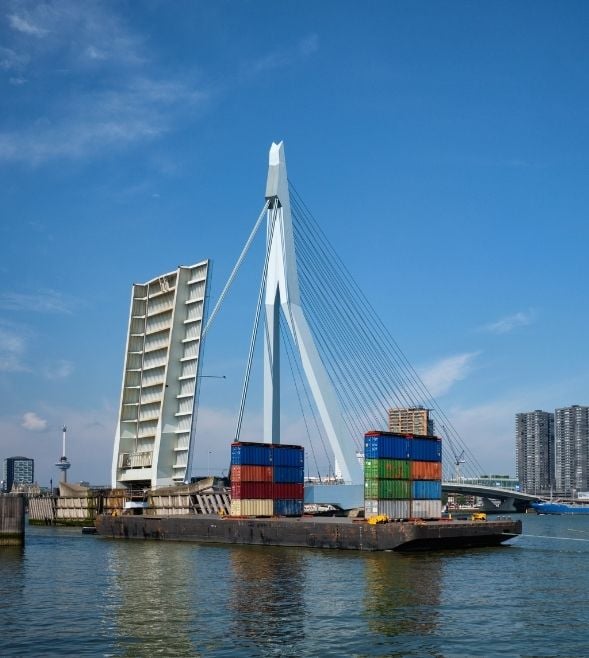-
Financial administration & outsourcing
Entrepreneurs who outsource financial administration reduce the number of administrative tasks and consequently have more time and space to focus on growth.
-
Financial insight
We help you turn financial data into valuable insights that support you in making well-founded decisions. In-depth analyses of your financial situation will help give you a better idea of where you stand and where the opportunities for growth lie, both in the short and long term.
-
Financial compliance
We make sure your company complies with financial legislation and regulations, with correct financial statements, tax reports and other obligations. From our global network, we support you in managing local and international tax risks.

-
Impact House by Grant Thornton
Building sustainability and social impact. That sounds good. But how do you go about it in the complex world of stakeholders, regulations and frameworks and changing demands from clients and society? How do you deal with important issues such as climate change and biodiversity loss?
-
Business risk services
Minimize risk, maximize predictability, and execution Good insights help you look further ahead and adapt faster. Whether you require outsourced or co-procured internal audit services and expertise to address a specific technology, cyber or regulatory challenge, we provide a turnkey and reliable solution.
-
Cyber risk services
What should I be doing first if my data has been kidnapped? Have I taken the right precautions for protecting my data or am I putting too much effort into just one of the risks? And how do I quickly detect intruders on my network? Good questions! We help you to answer these questions.
-
Deal advisory
What will the net proceeds be after the sale? How do I optimise the selling price of my business or the price of one of my business activities?
-
Forensic & integrity services
Do you require a fact finding investigation to help assess irregularities? Is it necessary to ascertain facts for litigation purposes?
-
Valuations
Independent and objective valuations tailored for mergers, acquisitions, and legal matters.

-
Auditing of annual accounts
You are answerable to others, such as shareholders and other stakeholders, with regard to your financial affairs. Financial information must therefore be reliable. What is more, you want to know how far you are progressing towards achieving your goals and what risks may apply.
-
IFRS services
Financial reporting in accordance with IFRS is a complex matter. Nowadays, an increasing number of international companies are becoming aware of the rules. But how do you apply them in practice?
-
ISAE & SOC Reporting
Our ISAE & SOC Reporting services provide independent and objective reports on the design, implementation and operational effectiveness of controls at service organizations.

-
International corporate tax
The Netherlands’ tax regime is highly dynamic. Rules and the administrative courts raise new challenges in fiscal considerations on a nearly daily basis, both nationally and internationally.
-
VAT advice
VAT is an exceptionally thorny issue, especially in major national and international activities. Filing cross-border returns, registering or making payments requires specialised knowledge. It is crucial to keep that knowledge up-to-date in order to respond to the dynamics of national and international legislation and regulation.
-
Customs
Importing/exporting goods to or from the European Union involves navigating complicated customs formalities. Failure to comply with these requirements usually results in delays. In addition, an excessively high rate of taxation or customs valuation for imports can cost you money.
-
Human Capital Services
Do your employees determine the success and growth of your organisation? And are you in need of specialists which you can ask your Human Resources (HR) related questions? Human Resources (HR) related questions? Our HR specialists will assist you in the areas of personnel and payroll administration, labour law and taxation relating to your personnel. We provide you with high-quality personnel and payroll administration, good HR guidance and the right (international) advice as standard. All this, of course, with a focus on the human dimension.
-
Innovation & grants
Anyone who runs their own business sets themselves apart from the rest. Anyone who dares stick their neck out distinguishes themselves even more. That can be rather lucrative.
-
Tax technology
Driven by tax technology, we help you with your (most important) tax risks. Identify and manage your risks and become in control!
-
Transfer pricing
The increased attention for transfer pricing places greater demands on the internal organisation and on reporting.
-
Sustainable tax
In this rapidly changing world, it is increasingly important to consider environmental impact (in accordance with ESG), instead of limiting considerations to financial incentives. Multinational companies should review and potentially reconsider their tax strategy due to the constantly evolving social standards
-
Pillar Two
On 1 January 2024 the European Union will introduce a new tax law named “Pillar Two”. These new regulations will be applicable to groups with a turnover of more than EUR 750 million.
-
Cryptocurrency and digital assets
In the past decade, the utilization of blockchain and its adoption of a distributed ledger have proven their capacity to revolutionize the financial sector, inspiring numerous initiatives from businesses and entrepreneurs.
-
Streamlined Global Compliance
Large corporations with a presence in multiple jurisdictions face a number of compliance challenges. Not least of these are the varied and complex reporting and compliance requirements imposed by different countries. To overcome these challenges, Grant Thornton provides a solution to streamline the global compliance process by centralizing the delivery approach.
-
Corporate Law
From the general terms and conditions to the legal strategy, these matters need to be watertight. This provides assurance, and therefore peace of mind and room for growth. We will be pro-active and pragmatic in thinking along with you. We always like to look ahead and go the extra mile.
-
Employment Law
What obligations do you have with an employee on sick leave? How do you go about a reorganisation? As an entrepreneur, you want clear answers and practical solutions to your employment law questions. At Grant Thornton, we are there for you with clear advice, from contracts and terms of employment to complex matters such as dismissal or reorganisation.
-
Sustainable legal
At Grant Thornton, we help companies integrate sustainability into their business operations, with sustainable legal at the heart of our approach. We advise on ESG (Environmental, Social, Governance) legislation, and help draft sustainable contracts, implement HR policies, and carry out ESG due diligence in M&A transactions (Mergers and Acquisitions).
-
Maritime sector
How can you continue to be a global leader? The Netherlands depends on innovation. It is our high-quality knowledge which leads the maritime sector to be of world class.


Background
If you pay your VAT late, then you may become liable to pay interest on that delay (so-called ‘default interest’). On the other hand, if tax authorities are late in refunding your VAT, then you may become entitled to earn interest on VAT refunded late to you.
The ECJ has ruled that if laws of a Member State (MS) are in breach of EU law (and this MS consequently levies tax in breach of EU law), interest should be paid for the entire time during which the taxpayer was without funds levied in violation of EU law. According to the ECJ, this means that the tax authority should pay interest for the period between the date of undue payment of tax and the date of repayment thereof. This interest is also called an ‘Irimie interest’.
Facts of the case
A Dutch municipality (Gemeente Dinkelland) carries out both economic and non-economic activities. Its economic activities are either subject to VAT or exempt. Gemeente Dinkelland is entitled to a deduction on general costs by applying an allocation key (a so-called ‘pro rata’). Following changes in the legislation for municipalities, Gemeente Dinkelland was entitled for deduction of more VAT than it initially deducted in 2012-2016.
Furthermore, an audit of accounts of Gemeente Dinkelland revealed that it had showed an excessive amount of payable VAT in its VAT returns for previous five years. Therefore, the municipality requested a refund of VAT from the Dutch Tax Administration
The Dutch Tax Administration granted a refund of the requested VAT amount and also paid interest because the refund took place outside the legal time limits. However, Gemeente Dinkelland did not receive the interest from the moment that it had overpaid VAT but from the moment it had filed the VAT refund claim. The municipality appealed because it thought that it was entitled to ‘Irimie interest’, payable from the date of undue payment of tax.
Questions
The ECJ was asked to clarify whether a right to earn interest (and if yes, from when) arises where the refund is the result of:
- Administrative errors on the part of the VAT payer and for which the inspector cannot be blamed in any way;
- A recalculation of the pro rata for the deduction of VAT on general costs.
Decision/conclusion on overpaid VAT
The ECJ concluded that Gemeente Dinkelland’s VAT repayment stemmed from its failure to exercise a right of deduction, rather than from a breach of EU law. Therefore, interest on the repayment did not start to accrue from the date when VAT was originally overpaid.
The ECJ ruled that the EU law does not require the payment of interest to a taxable person upon the refund of VAT, if the refund is partly due to the taxable person’s errors in deducting input VAT and partly due to retroactive changes in rules established by the taxable person for calculating deductible VAT related to general costs.
Consequences for the practice
The taxpayers are entitled to interest payable on overpaid VAT, calculated from the time of overpayment of tax when this was collected. This is due to the application of "national legislation incompatible with EU law or a requirement on the part of the Tax Administration". However, if tax is overpaid because of errors of taxable person or because of retroactive changes in national rules, then the interest is due from the moment that the corrections are made in VAT returns, or a VAT claim is filed to the tax authority.
Do you have any questions about VAT?











